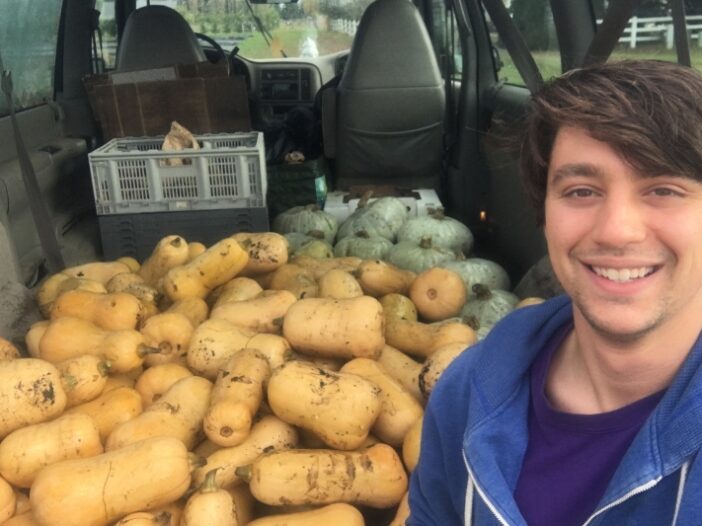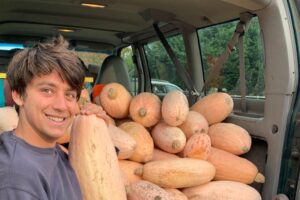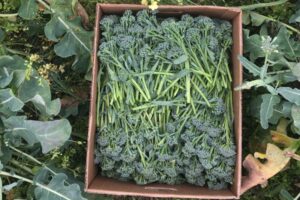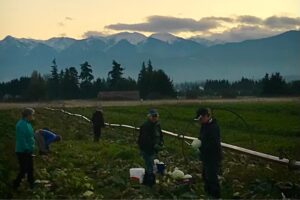
Our current exhibition, ‘What’s For Lunch?’ is inspired by Gene White, former Whidbey Island resident and food champion. White was the founder of the Global Child Nutrition Foundation and was internationally recognized for her lifelong dedication to child nutrition advocacy work. Fortunately, we are surrounded by food champions in Clallam County who are carrying on the legacy of Gene White by leading out on similar work in our local community. From farmers cultivating local food to the everyday heroes crafting our daily meals or the organizations devoted to supporting food security and healthy food access, we are fortunate to have such a devoted community of advocates.
We believe WSU Clallam County Extension Food Access and Waste Prevention Coordinator Benji Astrachan is one of those food champions. Benji has been working with WSU for the past four years on a number of food security and access projects including the Little Free Pantries, the Farm Gleaning Program, food waste prevention initiatives and food bank supports. Benji additionally volunteers with the Port Angeles Farmers Market on their Board of Directors, and the Port Angeles Food Not Bombs group serving regular community meals. Finally, Benji has worked on local farms for years, including a season on River Run Farm in Sequim and the last four seasons on SisterLand Farms in Port Angeles.
We recently had the chance to chat with him about why he thinks the local food system is so important. “Food touches all aspects of all of our lives – whether it’s living in a rural agricultural community like Clallam County, the health and wellness of ourselves and our loved ones that comes from what we eat, the way our food dollars impact the shape and depth of local/regional/global food systems, the environmental tolls or benefits associated with each of our food choices, the list goes on… By choosing to buy local and responsibly produced food, by being well-informed about how nutrition and diet affect our living experiences, by understanding the power our food dollars have in supporting local livelihoods and good labor practices, and by many more actions related to food and eating that we all make every day, each one of us have a profound impact on the health and resilience of our local food system and build a community where everyone can indiscriminately access the best food, with countless benefits rippling out through all our lives.”
Benji helped us develop a short list highlighting a few of the many local organizations who are championing local food and food access for all in Clallam County. Here are just a few we think you should know about:
North Olympic Land Trust
The North Olympic Land Trust has been a true local food systems hero in their relentless work to protect and conserve farmland across Clallam County for future generations. At a time when land development is soaring, they work with local farmers and landowners to ensure that agricultural spaces are set aside for future farms, while prioritizing and funding environmental initiatives on those lands to preserve wildlife habitat, biodiversity and clean watersheds. This work looks far to the future, anticipating changing climates and population shifts across the region, and this vision is essential to ensuring agriculturalists will be able to continue creating and expanding resilient local food systems that steward the community as much as the land and natural resources on which we all rely. Explore the different ways to support and give to the North Olympic Land Trust here: https://northolympiclandtrust.org/ways-to-give/
WSU Regional Small Farms Program
The WSU Extension-based team behind the Regional Small Farms program spans Clallam, Jefferson and Kitsap counties, and creates and implements a dazzling array of programming, technical assistance and institutional support – all dedicated to helping local farmers grow and thrive in our region. From the WSU Clallam Extension office, farmers are able to access one-on-one expertise from Dan McCarty on livestock and animal health topics, from Sallie Constant on Farm to Food Bank grants and local markets expansion, and from Laurel Moulton on ‘Integrated Pest Management’ and on-farm environmental practices for healthier and more produce plants and soils. The program also connections growers to one another, offers many classes and trainings, studies and shares research on modern farm practices, and many other essential services that contribute to the robust and resilient local food system of the North Olympic Peninsula. Follow this link to learn more about all that’s happening with the Regional Small Farms
program: https://extension.wsu.edu/regionalsmallfarms/
Port Angeles Food Bank
Look no further than our very own Port Angeles Food Bank to find a hardworking team of local food heroes, changing the landscape of food access for the better every day. Led by executive director Emily Dexter, Food Bank staff and volunteers weathered the COVID pandemic with record-high client numbers as our neighbors struggled with health and employment issues and sought support from the Food Bank. Furthermore, they relocated the Food Bank to a beautiful new space where clients now ‘shop’ for food in a grocery-store setting. This modern take on food banking prioritizes the dignity and autonomy of clients who can get free food while still prioritizing their dietary needs and culturally appropriate foodways. With a full-sized kitchen coming online, the Port Angeles Food Bank will soon also be able to help reduce food waste and further expand its offerings with prepared food items and space for community food processing
projects. To read more about how the Port Angeles Food Bank is blazing a new trail in the national emergency food landscape, click here: https://extension.wsu.edu/clallam/article/the-new-way-of-%E2%80%8B%E2%80%8Bbanking-food-for-wellness/
Peninsula Food Coalition
The Peninsula Food Coalition is a network of agencies and organizations supporting food security and improving access to food and nutritional supports for all Clallam residents, brought together monthly by the WSU Clallam Extension’s Community Health and Food Access program to collaborate and create solutions to end hunger. The long list of PFC participants includes local and Tribal food banks, community meal programs, regional and statewide food access agencies, nutrition and diet educators, farmers and food producers, and local government staff. Despite the diversity of professions and backgrounds, they all share a deep commitment to improving the health and wellness of all people through expanded access to local, healthy foods without restrictions. This network has been recognized and replicated across the state for their community-forward and grassroots style of tackling problems together, sharing resources, advocating for their clients and changing systems and institutions for the better.
Clallam Gleaners
The Clallam Gleaners is a volunteer network to prevent food waste and get healthy local food to those in need organized by Sharah Truett at the WSU Clallam Extension office. When local homeowners, gardeners and small farms have fruits and veggies they can’t get to, Sharah calls on a community of several hundred volunteers to quickly mobilize and harvest the produce. From there, the food is brought to our area’s food banks, community meal programs, Little Free Pantries or even directly to neighbors and community members in need. This program annually rescues well over 10,000 lbs of food – mostly tree fruit, but also plenty of vegetables and even plant starts – that would otherwise go to waste. With such abundant local and healthy produce flowing into the community, the Clallam Gleaners are true food champions fighting against hunger and food insecurity in our county. Interested in doing some gleaning yourself? Read more and join the volunteer list here: https://clallamgleaners.org/
Port Angeles Food Not Bombs
The Port Angeles chapter of the Food Not Bombs group has been serving free community meals every other Saturday for several years now. Formed from the model of the international Food Not Bombs movement, this loose group of community volunteers brings a delicious and diverse selection of hot and cold food to a downtown park every 2nd and 4th Saturday of the month, often combining the meals with clothing giveaways and informational resources about housing, employment, healthcare and other programs to help those struggling in our area. With a strong focus on self-determination and human rights, this group is one of the town’s leaders in building community around a common right to food and true
inclusivity. Follow them on social media to learn how to support the cause and get involved – and go grab a lunch and make some new friends yourself!
Sequim Food Bank
The Sequim Food Bank is a busy, busy place – teeming with kind and dedicated staff and volunteers serving their fellow neighbors and building a strong community for tomorrow. Along with other regional emergency food agencies and the Peninsula Food Coalition, Andra Smith and the Sequim Food Bank team have been changing the face of food security work by putting dignity and community development at the forefront. With their innovative partnerships through the Sequim Health and Housing Collaborative, these fine folks are sparking change at a systemic and institutional level, to make Sequim a place where all people are able to thrive and live healthy and happy lives. To get involved, check out their website here: https://www.sequimfoodbank.org/



